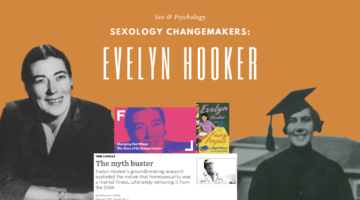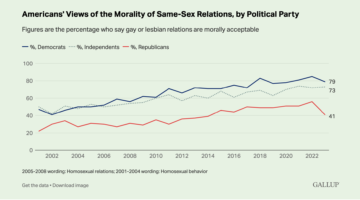Why Are Some People Against Same-Sex Marriage?
May 14, 2012 by Justin Lehmiller
Everyone was talking about same-sex marriage last week. First, voters in North Carolina approved a constitutional amendment banning legal recognition of same-sex relationships. Just a day later, even bigger news was made when President Obama publicly stated his support for extending marriage rights to gay and lesbian couples. All of this talk about same-sex marriage got me thinking about why so much variability exists in people’s attitudes toward this issue and, particularly, why some people are so resistant to it. Of course, religion plays a very large role in determining people’s views on marriage. However, research suggests that there may also be some important psychological processes underlying opposition to marriage equality.
My colleagues and I explored one of these psychological factors in a recent set of experiments [1]. We looked at opposition to same-sex marriage from the perspective of Social Identity Theory. The major thing you need to know about this theory is that we are motivated to make our ingroups (i.e., all of the groups we belong to, including our racial, gender, and national groups) distinct from other groups, such that our ingroups end up appearing in a better light. In other words, we find ways to make the groups we belong to look special relative to other groups because it fulfills a basic need we have to feel good about ourselves. Whenever this positive view we hold of our ingroup is threatened by an outgroup, we respond by challenging that group in an attempt to hold onto our social status.
We argue that marriage is one of the factors that makes heterosexuals distinct from gays and lesbians. To the extent that equal marriage rights are extended to same-sex couples, it would eliminate the current status difference between heterosexuals and homosexuals. Same-sex marriage thus represents a symbolic threat to the identity of heterosexuals as a group and, consequently, this threat may generate opposition to expanding the definition of marriage. Given this rationale, heterosexuals should be more inclined to support same-sex “civil unions” over “marriages,” because the former allows them to retain their distinctiveness and positive identity. Thus, the prediction we advanced was that heterosexuals would be less inclined to support same-sex “marriages” than “civil unions” because the “marriage” term would be perceived as more threatening to heterosexuals’ group identity.
To test this idea, we presented participants with two versions of a hypothetical state law that would grant legal relationship recognition to same-sex couples. The only thing that differed between the laws was the title—half of the time we referred to it as a same-sex “marriage” law and half of the time we referred to it as a same-sex “civil union” law. After reading one of the laws, participants answered a series of questions about it. Our results indicated that participants consistently expressed less support for the marriage law than the civil union law, as expected. Participants also rated the marriage law as more threatening to heterosexuals (i.e., it was perceived as more harmful to heterosexuals’ rights and social status), and statistical analyses indicated that this threat partially explained the difference in support for the two laws.
These results suggest that one of the reasons opposition to same-sex relationships remains so strong is because marriage is viewed as an institution that benefits and elevates the status of heterosexuals in society. Of course, attitudes toward marriage are much more complex that this, but we would be well-served by giving greater consideration to this and other psychological mechanisms that may provide us with a more complete understanding of why same-sex marriage continues to be such a polarizing issue.
Want to learn more about Sex and Psychology? Click here for previous articles or follow the blog on Facebook (facebook.com/psychologyofsex), Twitter (@JustinLehmiller), or Reddit (reddit.com/r/psychologyofsex) to receive updates.
[1] Schmitt, M. T., Lehmiller, J. J., & Walsh, A. L. (2007). The role of heterosexual identity threat in differential support for same-sex “civil unions” versus “marriages.” Group Processes and Intergroup Relations, 10, 443-455.
Image Source: iStockphoto.com
Related articles:

Dr. Justin Lehmiller
Founder & Owner of Sex and PsychologyDr. Justin Lehmiller is a social psychologist and Research Fellow at The Kinsey Institute. He runs the Sex and Psychology blog and podcast and is author of the popular book Tell Me What You Want. Dr. Lehmiller is an award-winning educator, and a prolific researcher who has published more than 50 academic works.
Read full bio >


